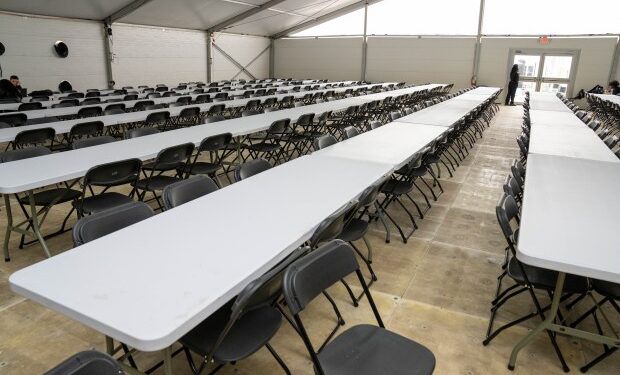More than two dozen migrant housing sites will close in the next two months, including the megashelter at Floyd Bennett Field, as the flow of migrants coming into the city slows, City Hall announced Tuesday.
Migrant families at the Floyd Bennett Field shelter, in southern Brooklyn, will be moved out by Jan. 15, though the site won’t be totally wound down until March, according to city government sources.
The move to close the controversial shelter is the latest sign of the city’s migrant crisis scaling down, and it was cheered by advocates who feared President-elect Donald Trump’s administration could use the site to house migrants targeted for deportation.
In total, the city will be shuttering 25 migrant housing facilities by March, including a shelter at an unused hangar at Kennedy Airport, the Stratford Arms site on the Upper West Side and the Randalls Island tent camp, according to Mayor Adams’ office.
The closures mark a turning point for the city’s migrant crisis. The Big Apple has seen its migrant population in shelters decrease for 22 weeks straight, now reaching its lowest point since summer 2023, according to City Hall. Still, tens of thousands of migrants remain in the city’s care.
With the incoming Trump administration’s threat of mass deportations, officials and advocates had worried that Floyd Bennett Field, which is within the city’s bounds but on federal land controlled by the National Park Service, could be prey to immigration authorities looking to round up migrants.
“The fact that it’s federal land just made it so urgent and dire,” Ariana Hellerman, of the volunteer group Floyd Bennett Field Neighbors, told the Daily News. “So we are beyond the moon. And we’ve had active campaigners working with us because everyone recognized how bad the situation could potentially be. We are thrilled.”
City government sources involved in the Floyd Bennett Field closure told The News the site won’t be totally shuttered until March because the Adams administration needed to give the feds a 90-day notice on ending the lease. That notice was filed Tuesday morning, but the sources affirmed no one will be living onsite as of Jan. 15.
Migrants who currently live at Floyd Bennett Field and still need housing once the shelter shutters are expected to be directed to other city sites with vacancies, the sources said. It wasn’t immediately clear what sites in particular they’ll be sent to.

Hellerman’s mutual aid group has worked alongside the roughly 2,000 migrants living at Floyd Bennett Field for the past year, helping provide clothing, suitcases, food and other necessities to the families there.
After Trump’s victory, the group lobbied city and state elected officials to shut down the site before Trump came into office, fearing the site’s location on federal land would make those residing on it vulnerable to deportation. The site is now set to be vacated five days before Trump’s Jan. 20 inauguration.
“In preparation for the president-elect’s plans to implement mass deportations nationwide, we are closely monitoring these closures and transfers to ensure new arrivals’ access to shelter and protection from any potential federal immigration enforcement dragnets,” Legal Aid and the Coalition for the Homeless said in a joint statement after City Hall’s announcement.

In a statement Tuesday announcing the closures, Adams credited the city’s 30- and 60-day shelter stay limits and case management efforts and said the city will look for more sites to close.
“Thanks to our smart management strategies, we’ve turned the corner, and this additional slate of shelter closures we’re announcing today is even more proof that we’re managing this crisis better than any other city in the nation,” Adams said.
The Floyd Bennett site has come under fire from advocates since it opened because of its location on a remote former airfield far from schools and in a flood-prone area.
Legal Aid and the Coalition for the Homeless said they welcome the closure but will be watching to ensure children’s education is not disrupted. “We are mindful of the disruption it causes to the families we serve, who above all else are longing for stability,” the organizations wrote.

Jennifer Pringle, who directs the students in temporary housing portfolio at Advocates for Children, said that shifting shelter placements and frequent moves make kids’ education “horribly disrupted.”
She worried that students living at Floyd Bennett, who have been exempt from 60-day shelter stay limits, will be destabilized by relocating mid-school year.
“So as the city closes Floyd Bennett Field, it’s going to be really important that families know kids can stay in their own schools, that there’s busing available,” Pringle said. “… Kids’ education should not be left on the sidelines as the city moves ahead with these changes.”
Originally Published:







